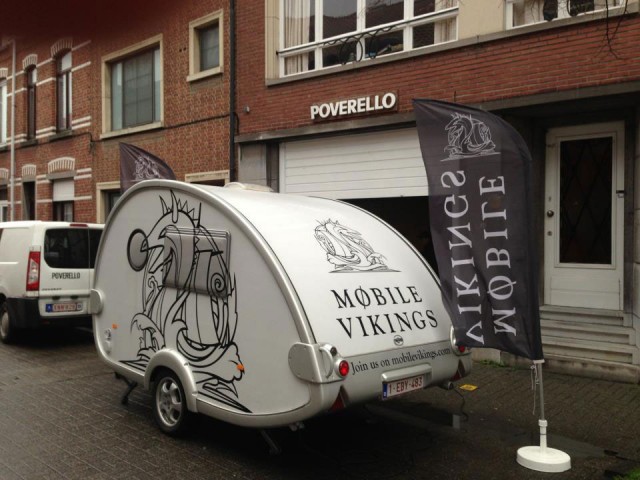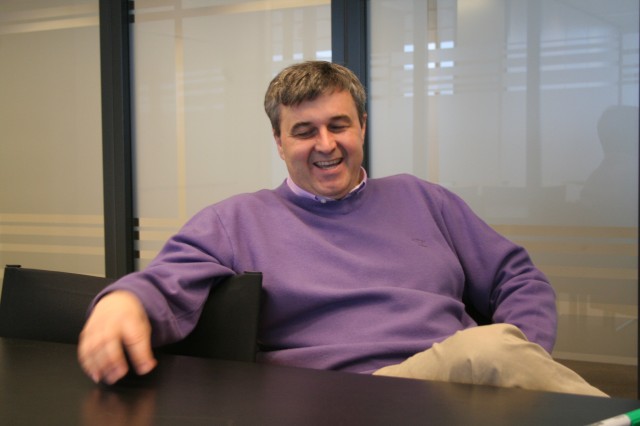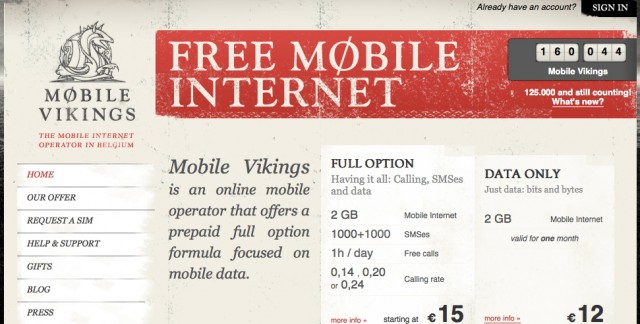Belgium-based, Viking-named startup wants to vanquish mobile data costs
Mobile Vikings wants free mobile data for users—and its sights are set on the US.

But with any luck, Mobile Vikings just may give local providers a run for their money—with the goal of bringing the price of all mobile phone use to a drastically-low level.
"We want the cost for the users to become zero," said Frank Bekkers, the company's founder and CEO.
Coincidentally, the city of Hasselt is well-known in Belgium for having introduced free public transport for local residents since 1996. From his sparsely-decorated office in a corporate park five-minutes' walk outside the parish of Kiewit's semi-rural two-track train station—the animated, fast-talking Belgian outlined his company's new plan to bring down the cost of mobile data.
"We say somebody has to pay the bill. Our goal is that the users have to pay for the cost of using the network," he added. "But we believe that third-parties will be happy to pay the bill of the users if they buy stuff with them."
Starting in April 2013, Mobile Vikings will roll out a daily deal-style app to encourage users to support local business across Flanders (the Flemish-speaking region of Belgium). Eventually this will expand to all of Belgium. Similar to sites like Groupon or LivingSocial, the smartphone app incentivizes users to "check in" to a given location in exchange for discounts. Once the users makes a purchase through the deal on the app, they will receive "Viking Points," which can be exchanged for top-up credit to be used to buy more voice minutes, text messages, or ideally, more mobile data. Ten Viking Points yields €1 of credit.
"We see that mobile Internet is something that everybody should have," he said. "We want to make this for free in the end. If you go to a shop and you buy something with a credit card, you don't have to pay for using the credit card. [When you buy something,] you should get a small reward, you can use your phone for free. That's the business model we're trying to prove in Belgium. We strongly believe that this is the future."
Bekkers plans to travel to California this year to meet with Silicon Valley investors. With any luck, he hopes Mobile Vikings would expand to the United States a year from now. (Another coincidence: one of Hasselt's sister cities is Google's hometown, Mountain View, California.)
"If we can build the same success [that we have now] in Belgium, we would have three million customers in the United States," he said. Bekkers explained that currently, his 160,000 customers represents approximately one percent of the crowded mobile market in Belgium. In the country, there are three large firms and 40 mobile virtual network operators (MVNO), like Mobile Vikings, who buy mobile service wholesale from larger providers.

Enlarge / Frank Bekkers, the founder and CEO of Mobile Vikings, hopes he'll have the last laugh against mobile incumbents.
Crossing borders
Back in 2009, the Belgian entrepreneur founded the company with just seven employees (the company now has 53) on one simple premise: incumbent, large mobile operators charge too much for mobile data. And their customer service is terrible.As an MVNO, Mobile Vikings contracts with the incumbent Dutch telco KPN to provide the actual mobile network infrastructure. The larger firm has a 45 percent stake in the startup.
In December 2012, Mobile Vikings expanded service to KPN's home country, the Netherlands, and has now become the first mobile provider to have free cross-border data roaming between two neighboring countries. But, that offer is scheduled to expire in mid-March 2013.
In the coming months, Mobile Vikings will have launch parties throughout the Netherlands, and will be giving away a very useful Mobile Vikings-branded item for anyone gearing up for the rest of the European winter and early spring: rubber rain boots.
Having done zero marketing throughout its nearly four years of existence, the Belgian startup now has around 160,000 total customers according to its online counter featured prominently on its website. In another effort to keep costs down, its SIM cards can only be bought online, not from any shops. Its customer service is largely done through social media (Twitter and Facebook), and its customers are amongst the most tech-savvy—99 percent of the clientele, according to Bekkers, have smartphones.
The company's efforts seem to have worked: revenues now stand at €3 million ($4.08 million) monthly, and Mobile Vikings is looking for more funding. Bekkers said between a new round of investment this year in Europe and the US, he hopes to raise €10 million ($13.63 million).
"We are quite proud that we have the lowest churn, we lose six percent on a yearly basis," he said, noting that most European prepaid MVNOs lose around 30 to 40 of their existing customer base annually.
Bekkers attributes this low rate to the savviness of his clientèle, as well as excellent customer service.
"Some people need to pay too much to be happy," he said.
Classic, Medium and Jumbo
Unlike in the United States, where most customers are on a postpaid contract (although, as we've reported, that's starting to change), the majority of Europeans use a debit-style prepaid system. Customers add credit on an ad-hoc basis, paying only for the text messages and calls that they make. The United States is one of the few countries in the world where both parties (sending and receiving) pay for the call—in most countries, only the sending party pays.Today, Mobile Vikings offers two basic plans. The first is a more typical European-style plan, with 2GB of mobile data and 1,000 texts, but with varying per-minute calling rates. At €15 ($20.45) per month ("Classic"), the calling rate is €0.24 ($0.32) per minute. The "Medium" plan at €25 ($34.08) per month with a calling rate of €0.20 ($0.27) per minute, and the "Jumbo" plan (€40 per month, or $54.52) sees the rate fall further: €0.14 ($0.19) per minute.

Bekkers told Ars that for now, about 20 percent of his customers choose the data-only plan. (Full disclosure: while reporting in Belgium over the last week, I became a paying Mobile Vikings customer, after having heard about the service in 2011 from Amelia Andersdotter, a Swedish Pirate Party member of the European Parliament. I happily used the Classic plan on my unlocked iPhone for the three days that I was in Belgium.)
So why wouldn't KPN, as a large telco, simply try this out on their own? Bekkers said MVNOs can be a way to target segmented portions of the market and expand their reach. Already, there are plenty of mobile brands that target grocery store shoppers in major supermarkets across Europe, like Carrefour, Aldi, and Tesco. Others, like Ay Yaldiz, target Turkish immigrants to various European countries (especially Germany), and offer attractive calling plans to Turkey and advertise in Turkish.
Admittedly, Mobile Vikings has an uphill battle.
"[Over the last six years], I have seen several MVNO business models appear and disappear," said Jessica Ekholm, a mobile industry analyst at Gartner Research.
"The most successful MVNOs have generally offered low cost-prepaid mobile services, and/or low-cost international calling for migrant workers and/or have had a strong retail presence and brand such as supermarkets. The UK supermarket Tesco for example also sell SIMs and handsets via their mobile MVNO Tesco Mobile. There have been a few data only MVNOs but none of them have reached any greater success."

Enlarge / The Hasselt-Kiewit train station is about a five minute walk from Mobile Vikings' office.
"It was difficult for me to hold my horses, but now we have the best horses"
In Mobile Vikings' case, Bekkers is fully confident. As increasing numbers of mobile phone users have smartphones and are more interested in data rather than traditional voice plans, he believe KPN can learn from what he's doing."If we create this then we take the risk and if things go wrong it has no impact on their total model," he said.
Some analysts agree that Mobile Vikings (and its rivals) could point to future business models for other companies.
"Yes, it can be profitable if you can scale the business and learn to live with low margins," said Chetan Sharma, an independent mobile industry analyst. "It can be quite disruptive to the market. The Netherlands has already seen the tendency to just use data (KPN offers that) and younger generation pretty much demands such plans."
Bekkers adds that eventually, we'll all live in a completely data-driven mobile world, and that large telcos are simply moving too slow.
"The end of 2014, this is the moment that the shift will happen," he noted. "When I talk to telcos, I see that in middle management, [they get it,] and some in top see it too—they will have a problem [if they don't adapt]. It was difficult for me to hold my horses, but now we have the best horses, so we can go."



No comments:
Post a Comment